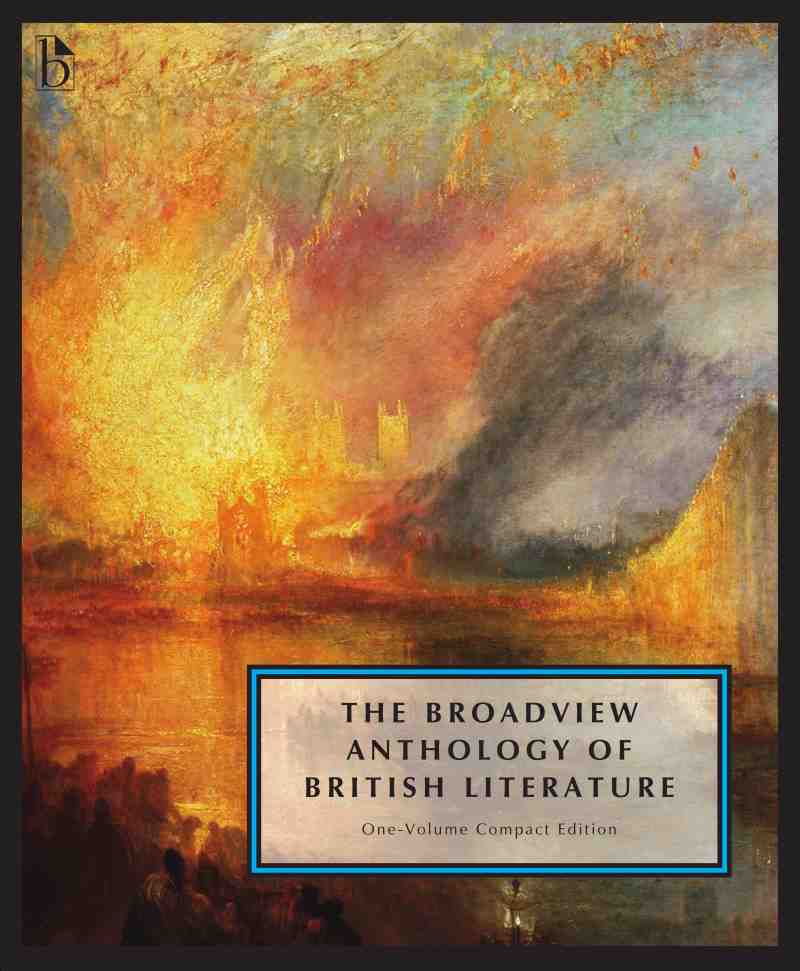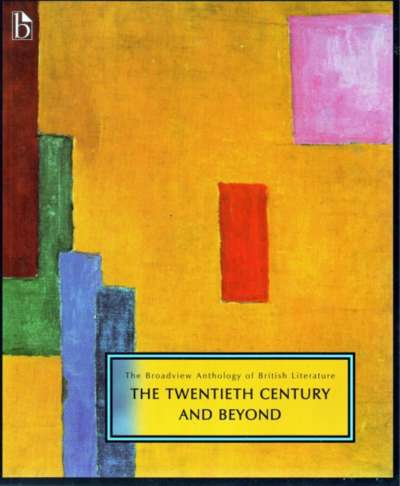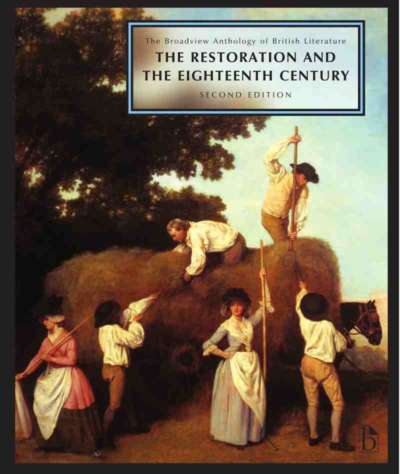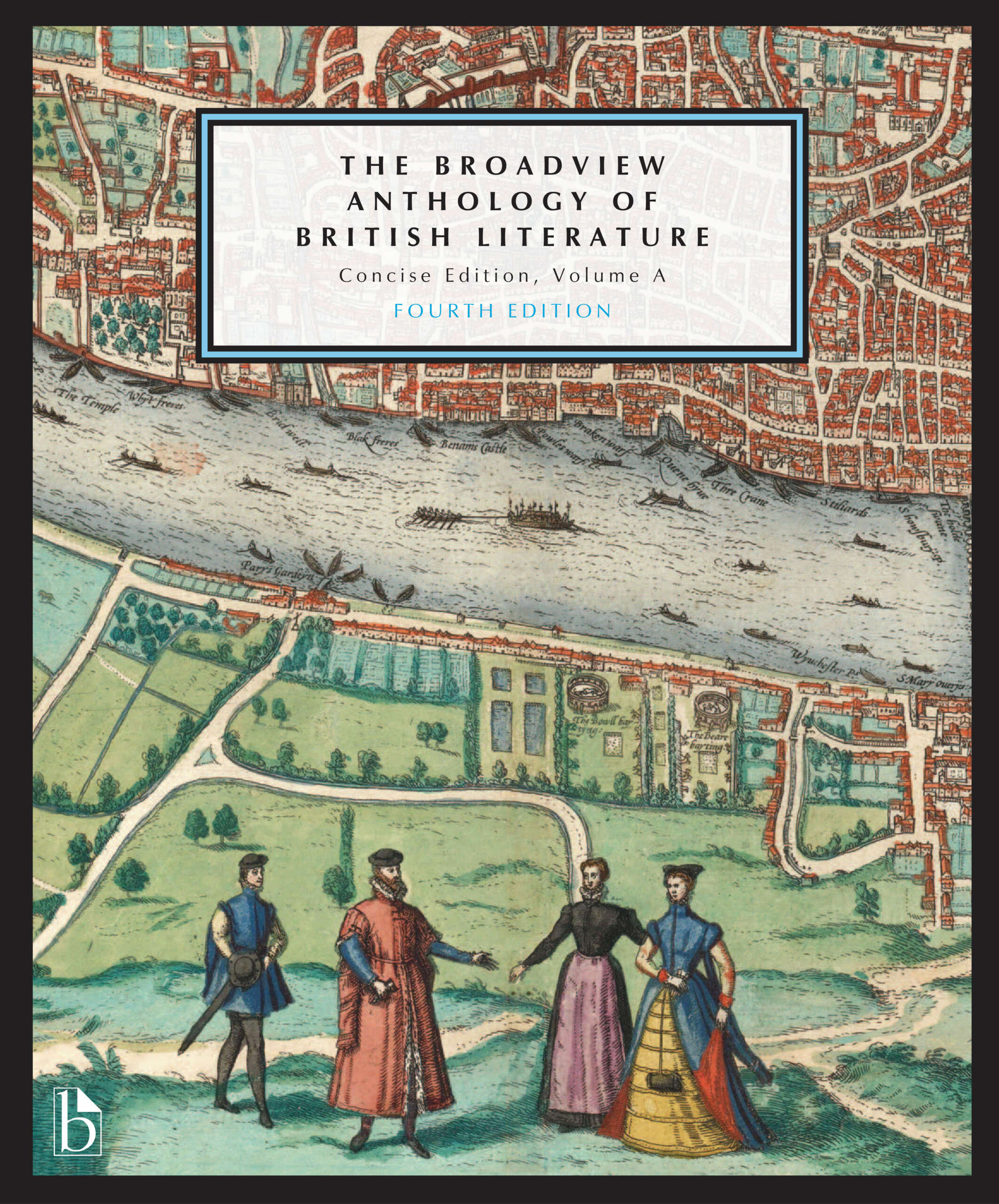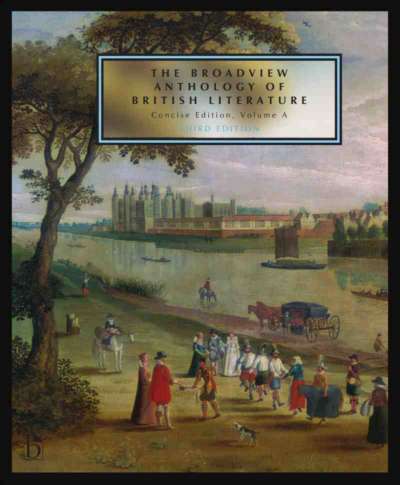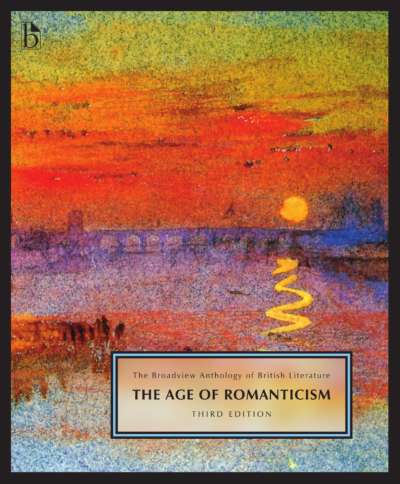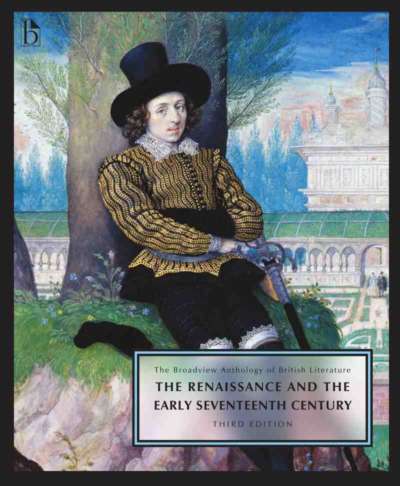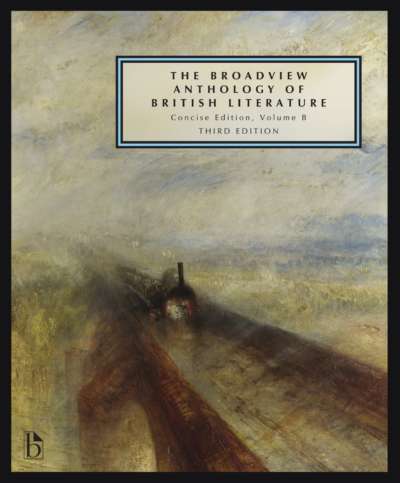In all six of its volumes, The Broadview Anthology of British Literature presents British literature in a truly distinctive light. Fully grounded in sound literary and historical scholarship, the anthology takes a fresh approach to many canonical authors, and includes a wide selection of work by lesser-known writers. The anthology also provides wide-ranging coverage of the worldwide connections of British literature, and it pays attention throughout to issues of race, gender, class, and sexual orientation. It includes comprehensive introductions to each period, providing in each case an overview of the historical and cultural as well as the literary background. It features accessible and engaging headnotes for all authors, extensive explanatory annotations, and an unparalleled number of illustrations and contextual materials. Innovative, authoritative and comprehensive, The Broadview Anthology of British Literature has established itself as a leader in the field.
The full anthology comprises six bound volumes, together with an extensive website component; the latter has been edited, annotated, and designed according to the same high standards as the bound book component of the anthology, and is accessible by using the passcode obtained with the purchase of one or more of the bound volumes.
For those seeking an even more streamlined anthology than the two-volume Concise Edition, The Broadview Anthology of British Literature is now available in a compact single-volume version. The edition features the same high quality of introductions, annotations, contextual materials, and illustrations found in the full anthology, and it complements an ample offering of canonical works with a vibrant selection of less-canonical pieces.
The compact single-volume edition also includes a substantial website component, providing for much greater flexibility. An increasing number of works from the full six-volume anthology (or from its website component) are also being made available in stand-alone Broadview Anthology of British Literature editions that can be bundled with the anthology.
Comments
Comments on The Broadview Anthology of British Literature:
“ … sets a new standard by which all other anthologies of British Literature will now have to be measured.” — Graham Hammill, SUNY Buffalo
“With the publication of the Broadview Anthology of British Literature, teachers and students in survey and upper-level undergraduate courses have a compelling alternative to the established anthologies by Norton and Longman. … This is a very real intellectual, as well as pedagogical, achievement.” — Nicholas Watson, Harvard University
“ … an excellent anthology. Good selections for my purposes (including some nice surprises), just the right level of annotation, affordable—and a hit with my students. I will definitely use it again.” — Ira Nadel, University of British Columbia
“Norton’s intros are good; Broadview’s are better, with greater clarity and comprehension, as well as emphasis upon how the language and literature develop, both reacting or responding to and influencing or modifying the cultural, religious/philosophical, political, and socio-economic developments of Britain. The historian and the linguist in me thoroughly enjoyed the flow and word-craftsmanship. If you have not considered the anthology for your courses, I recommend that you do so.” — Robert J. Schmidt, Tarrant County College
For a PDF of the table of contents, click here.
NOTE: The online component of the anthology offers a substantial number of additional readings, edited to the same standards as the bound book. Online readings appear in the hyperlinked sections below; to download these readings, please follow the hyperlinks to the BABL online resources site and log in using your passcode.
Preface
Acknowledgments
THE MEDIEVAL PERIOD
- THE MEDIEVAL PERIOD
- Errata Slip – on the use of “Anglo-Saxon” (sites.broadviewpress.com/bablonline)
- History, Narrative, Culture
Before the Norman Conquest
- Celts in Medieval Britain and Ireland
Roman Britain
Early Anglo-Saxon Britain
Celtic Culture
Celtic Christianity
Later Anglo-Saxon Britain
Invasion and Unification
- England after the Norman Conquest
- The Normans and Feudalism
Henry II and an International Culture
Wales, Scotland, Ireland: Norman Invasions and Their Aftermath
The Thirteenth Century
The English Monarchy
Cultural Expression in the Fourteenth Century
Fifteenth-Century Transitions
Language and Prosody
- HISTORY OF THE LANGUAGE AND OF PRINT AND MANUSCRIPT CULTURE
- BEDE (sites.broadviewpress.com/bablonline)
- from Ecclesiastical History of the English People
- A Description of the Island of Britain and Its Inhabitants
The Coming of the English to Britain
The Life and Conversion of Edwin, King of Northumbria; the Faith of
the East Angles
Abbess Hild of Whitby; the Miraculous Poet Cædmon
Cædmon’s Hymn in Old and Modern English
- EARLY IRISH LYRICS
- The First Satire
[A Bé Find, in rega lim] Fair lady, will you go with me
[Messe ocus Pangur Bán] Me and white Pangur
[Is acher in gáith innocht] The wind is wild tonight
[Techt do Róim] Going to Rome?
The Lament of the Old Woman of Beare
- CONTEXTS: THE CRISES OF THE FOURTEENTH CENTURY
- The Great Famine
- from Anonymous (the “Monk of Malmesbury”), Life of Edward the Second
- The Hundred Years’ War
- from Jean Froissart, Chronicle
from Prince Edward, Letter to the People of London
- The Black Death
- from Ralph of Shrewsbury, Letter (17 August 1348)
from Henry Knighton, Chronicle
- The Uprising of 1381 (sites.broadviewpress.com/bablonline)
- from Regulations, London (1350)
from Statute of Laborers (1351)
from Statute (1363)
from Jean Froissart, Chronicle, Account of a Sermon by John Ball
John Ball, Letter to the Common People of Essex, 1381
from Henry Knighton, Chronicle
- SIR GAWAIN AND THE GREEN KNIGHT
- IN CONTEXT: Illustrations from the Original Manuscript
- GEOFFREY CHAUCER
- To Rosemounde
from The Canterbury Tales
- JULIAN OF NORWICH
- from A Revelation of Love
- MARGERY KEMPE
- from The Book of Margery Kempe
- The Proem
The Preface
from Book 1
- CONTEXTS: RELIGIOUS AND SPIRITUAL LIFE
- Celtic Christianity
Church and Cathedral
Religion for All: The Apostle’s Creed, the Pater Noster, and the Hail Mary
- The Apostle’s Creed
The Pater Noster
The Hail Mary
- from Robert Manning of Brunne, Handlyng Synne
from William of Pagula, Priest’s Eye
from The Canons of the Fourth Lateran Council
Sin, Corruption, and Indulgence
- from William Langland, The Vision of Piers the Plowman (B-text)
- from Passus 1
Passus 5
from Passus 7
- from Thomas Wimbleton, Sermon
- Lollardy
- from Account of the Heresy Trial of Margery Baxter
- The Persecution of the Jews
- from Thomas of Monmouth, The Life and Miracles of St. William of Norwich
from Roger Howden, Chronicle
from Ordinances of the Jews
from Charter of King John to the Jews
from Ordinances of Henry III
Edward I’s Order
THE RENAISSANCE AND THE EARLY SEVENTEENTH CENTURY
- THE RENAISSANCE AND THE EARLY SEVENTEENTH CENTURY
- Humanism
Scientific Inquiry
The Reformation in England
Wales, Scotland, Ireland
Edward VI, Mary I, and Elizabeth I
Elizabeth I and Gender
Homoeroticism and Cross-Dressing
Economy and Society in the Sixteenth and Seventeenth Centuries
“The Round Earth’s Imagined Corners”
The Stuarts and the Civil Wars
Literary Genres
Literature in Prose and the Development of Print Culture
Poetry
The Drama
The English Language in the Sixteenth and Seventeenth Centuries
- HISTORY OF THE LANGUAGE AND OF PRINT CULTURE
- SIR THOMAS MORE
- from Utopia: The Best State of a Commonwealth and the New Island of Utopia
- WILLIAM TYNDALE
- Tyndale’s English Bible, King James Bible, Geneva Bible, Douay-Rheims Bible
- SIR THOMAS WYATT
- Sonnets
- 10 (“The long love that in my thought doth harbour”)
29 (“The pillar perished is whereto I leant”)
31 (“Farewell, Love, and all thy laws forever”)
- Epigrams
- 38 (“Alas, madam, for stealing of a kiss”)
48 (“Vulcan begat me; Minerva me taught”)
60 (“Tagus, farewell, that westward with thy streams”)
- Ballads
- Songs
- Epistolary Satires
- IN CONTEXT: Epistolary Advice (sites.broadviewpress.com/bablonline)
- HENRY HOWARD, EARL OF SURREY
- THE ELIZABETHAN SONNET AND LYRIC
- The Continental Background
- Francesco Petrarch
- from Rime Sparse
- 134 (“Pace non trovo et non ò da far guerra”)
134 (“I find no peace and all my war is done”)
140 (“Amor, che nel penser mio vive et regna”)
140 (“Love, that doth reign and live within my thought”)
189 (“Passa la nave mia colma d’oblio”)
189 (“My galley chargèd with forgetfulness”)
190 (“Una candida cerva sopra l’erba”)
190 (“Whoso list to hunt, I know where is a hind”)
- Gaspara Stampa (sites.broadviewpress.com/bablonline)
- 132 (“Quando io dimando nel mio pianto Amore”)
132 (“When in my weeping I inquire of Love”)
- Joachim Du Bellay (sites.broadviewpress.com/bablonline)
- 113 (“Si nostre vie est moins qu’une journée”)
113 (“If this, our life, be less than but a day”)
- Pierre de Ronsard (sites.broadviewpress.com/bablonline)
- (“Je vouldroy bien richement jaunissant”)
(“I would in rich and golden coloured rain”)
(“Quand vous serez bien vielle, au soir à la chandelle”)
(“When you are very old, by candle’s flame”)
- Samuel Daniel (sites.broadviewpress.com/bablonline)
- from Delia
- 6 (“Fair is my love, and cruel as she’s fair”)
28 (“Raising my hopes on hills of high desire”)
33 (“When men shall find thy flower, thy glory pass”)
- Michael Drayton (sites.broadviewpress.com/bablonline)
- from Idea
- 6 (“How many paltry, foolish, painted things”)
61 (“Since there’s no help, come let us kiss and part”)
63 (“Truce, gentle Love, a parley now I crave”)
- William Shakespeare
- from Romeo and Juliet (Act 1, Scene 5)
- Sir John Davies
- from Gulling Sonnets
- 3 (“What eagle can behold her sun-bright eye”)
- John Davies of Hereford (sites.broadviewpress.com/bablonline)
- from The Scourge of Villany
- (“If there were, oh! an Hellespont of cream”)
- Richard Barnfield (sites.broadviewpress.com/bablonline)
- from Cynthia
- 14 (“Here, hold this glove (this milk-white cheverel glove)”)
17 (“Cherry-lipped Adonis in his snowy shape”)
- George Gascoigne
- Anonymous
- Ode (“Absence, hear thou my protestation”)
- EDMUND SPENSER
- from The Faerie Queene
- Letter to Sir Walter Ralegh on The Faerie Queene
IN CONTEXT: The Redcrosse Knight (Illustration)
IN CONTEXT: Christian Armor
- from Paul’s Epistle to the Ephesians, 6.11–17 (Geneva Bible)
from Desiderius Erasmus, Enchiridion militis Christiani [Handbook of the Christian Soldier]
- IN CONTEXT: Spirituality and The Faerie Queene
- Heading to the Song of Solomon (Geneva Bible)
- from Amoretti
- 1 (“Happy ye leaves when as those lilly hands”)
3 (“The soverayne beauty which I doo admyre”)
6 (“Be nought dismayd that her unmovèd mind”)
15 (“Ye tradefull Merchants, that with weary toyle”)
22 (“This holy season fit to fast and pray”)
26 (“Sweet is the Rose, but growes upon a brere”)
34 (“Lyke as a ship that through the Ocean wyde”)
37 (“What guyle is this, that those her golden tresses”)
54 (“Of this worlds Theatre in which we stay”)
64 (“Comming to kisse her lyps, (such grace I found)”)
67 (“Lyke as a hunstman after weary chace”)
68 (“Most glorious Lord of lyfe that on this day”)
69 (“The famous warriors of the anticke world”)
70 (“Fresh spring the herald of loves mighty king”)
74 (“Most happy letters fram’d by skilfull trade”)
75 (“One day I wrote her name upon the strand”)
80 (“After so long a race as I have run”)
82 (“Joy of my life, full oft for loving you”)
89 (“Lyke as the Culver on the barèd bough”)
- Epithalamion (sites.broadviewpress.com/bablonline)
- SIR PHILIP SIDNEY
- from Astrophil and Stella
- 1 (“Loving in truth, and fain in verse my love to show”)
2 (“Not at first sight, nor with a dribbèd shot”)
7 (“When Nature made her chief work, Stella’s eyes”)
18 (“With what sharp checks I in myself am shent”)
20 (“Fly, fly, my friends, I have my death wound; fly!”)
21 (“Your words, my friend, (right healthful caustics) blame”)
22 (“In highest way of heav’n the Sun did ride”)
23 (“The curious wits seeing dull pensiveness”)
24 (“Rich fools there be, whose base and filthy heart”)
25 (“The wisest scholar of the wight most wise”)
26 (“Though dusty wits dare scorn astrology”)
27 (“Because I oft in dark abstracted guise”)
31 (“With how sad steps, O Moon, thou climb’st the skies”)
34 (“Come, let me write. ‘And to what end?’ To ease”)
39 (“Come, Sleep! O Sleep, the certain knot of peace”)
41 (“Having this day my horse, my hand, my lance”)
45 (“Stella oft sees the very face of woe”)
47 (“What, have I thus betrayed my liberty?”)
48 (“Soul’s joy, bend not those morning stars from me”)
49 (“I on my horse, and Love on me doth try”)
50 (“Stella, the fullness of my thoughts of thee”)
51 (“Pardon mine ears, both I and they do pray”)
52 (“A strife is grown between Virtue and Love”)
53 (“In marital sports I have my cunning tried”)
54 (“Because I breathe not love to every one”)
55 (“Muses, I oft invoked your holy aid”)
61 (“Oft with true sighs, oft with uncallèd tears”) (sites.broadviewpress.com/bablonline)
69 (“O joy too high for my low style to show!”)
71 (“Who will in fairest book of Nature know”)
94 (“Grief find the words, for thou hast made my brain”)
95 (“Yet Sighs, dear Sighs, indeed true friends you are”) (sites.broadviewpress.com/bablonline)
96 (“Thought, with good cause thou lik’st so well the Night”) (sites.broadviewpress.com/bablonline)
97 (“Dian, that fain would cheer her friend the Night”) (sites.broadviewpress.com/bablonline)
98 (“Ah bed, the field where joy’s peace some do see”) (sites.broadviewpress.com/bablonline)
99 (“When far-spent night persuades each mortal eye”) (sites.broadviewpress.com/bablonline)
100 (“Oh tears, no tears, but rain from Beauty’s skies”) (sites.broadviewpress.com/bablonline)
101 (“Stella is sick, and in that sickbed lies”)
102 (“Where be those roses gone, which sweetened so our eyes?”) (sites.broadviewpress.com/bablonline)
103 (“Oh happy Thames, that didst my Stella bear”) (sites.broadviewpress.com/bablonline)
104 (“Envious wits, what hath been mine offence”) (sites.broadviewpress.com/bablonline)
105 (“Unhappy sight, and hath she vanished by”) (sites.broadviewpress.com/bablonline)
106 (“Oh absent presence, Stella is not here”)
107 (“Stella, since thou so right a princess art”) (sites.broadviewpress.com/bablonline)
108 (“When Sorrow (using mine own fire’s might)”)
- from The Defence of Poesy (sites.broadviewpress.com/bablonline)
IN CONTEXT: The Abuse of Poesy (sites.broadviewpress.com/bablonline)
- from Plato, The Republic, from Book 2
from Stephen Gosson, The School of Abuse
- ELIZABETH I, QUEEN OF ENGLAND
- Written on a Wall at Woodstock
Written in Her French Psalter
The Doubt of Future Foes
On Monsieur’s Departure
When I Was Fair and Young
To Our Most Noble and Virtuous Queen Katherine
To the Troops at Tilbury
Two Letters from Elizabeth to Catherine de Bourbon
On Marriage
On Mary, Queen of Scots
On Mary’s Execution
The Golden Speech
IN CONTEXT: The Defeat of the Spanish Armada
- CONTEXTS: CULTURE: A PORTFOLIO
- Music
- from Izaak Walton, The Compleat Angler
- Painting
- from Nicholas Hilliard, A Treatise Concerning the Art of Limning
from A Letter to F.P. Verney from the Countess of Sussex
Oliver Cromwell, Instructions to His Painter, as Reported by George Vertue, Notebooks
- Games and Pastimes
- Food and Drink
- from An Anonymous Venetian Official Traveling in England, A Relation, or Rather a True Account, of the Island of England
from Fynes Moryson, Itinerary
Selected Illustrations
from Sarah Longe, Mrs. Sarah Longe Her Receipt Book
from William Harrison, Chronologie
- Children and Education
- The Supernatural and the Miraculous
- from Reginald Scot, The Discovery of Witchcraft
from George Gifford, A Discourse of the Subtle Practices of Devils by Witches and Sorcerers
from Joseph Hall, Characters of Virtues and Vices
from Sir John Harington, “Account of an Audience with King James I,” as recorded in Nugae Antiquae
Anonymous Broadsheet, “The Form and Shape of a Monstrous Child”
- Crime
- from “A True Report of the late Horrible Murder Committed by William Sherwood”
- Print Culture
- AEMILIA LANYER
- To the Virtuous Reader
from Salve Deus Rex Judæorum
- “Invocation”
“Eve’s Apology in Defense of Women”
- The Description of Cooke-ham
To the Doubtful Reader
- JOHN DONNE
- Hymn to God, My God, in My Sickness
from Songs and Sonnets
- from Elegies
- from Satires (sites.broadviewpress.com/bablonline)
- 3 (“Kind pity chokes my spleen; brave scorn forbids”)
- from Verse Letters (sites.broadviewpress.com/bablonline)
- To Sir Henry Wotton
An Anatomy of the World
- from Holy Sonnets
- 2 (“As due by many titles I resign”) (sites.broadviewpress.com/bablonline)
5 (“I am a little world made cunningly”)
6 (“This is my play’s last scene, here heavens appoint”)
7 (“At the round earth’s imagined corners, blow”)
9 (“If poisonous minerals, and if that tree”)
10 (“Death be not proud, though some have called thee”)
13 (“What if this present were the world’s last night?”)
14 (“Batter my heart, three personed God; for you”)
18 (“Show me, dear Christ, Thy spouse, so bright and clear”)
19 (“Oh, to vex me, contraries meet in one”)
- Good Friday, 1613. Riding Westward
A Hymn to God the Father
from Devotions
- LADY MARY WROTH
- from Pamphilia to Amphilanthus
- 1 (“When night’s black mantle could most darkness prove”)
6 (“My pain, still smothered in my grieved breast”)
7 (“Love leave to urge, thou know’st thou hast the hand”)
13 (“Dear, famish not what you your self gave food”)
14 (“Am I thus conquered? have I lost the powers”)
15 (“Truly poor Night thou welcome art to me”)
22 (“Like to the Indians, scorched with the sun”)
23 (“When every one to pleasing pastime hies”)
35 (“False hope which feeds but to destroy, and spill”)
- from A Crown of Sonnets Dedicated to Love
- 77 (“In this strange labyrinth how shall I turn?”)
- Railing Rhymes Returned upon the Author by Mistress Mary Wroth
IN CONTEXT: The Occasion of “Railing Rhymes”
- Edward Denny, Baron of Waltham, To Pamphilia from the father-in-law of Seralius
- ROBERT HERRICK
- The Argument of His Book
Delight in Disorder
Corinna’s Going A-Maying
To the Virgins, to Make Much of Time
The Hock-Cart, or Harvest Home
Upon Julia’s Clothes
- JOHN MILTON
- L’Allegro
Il Penseroso
Lycidas (sites.broadviewpress.com/bablonline)
Sonnets
- from Areopagitica: A Speech of Mr. John Milton for the Liberty of Unlicensed Printing, to the Parliament of England
- from Paradise Lost
- The Verse
Argument to Book 1
Book 1
Argument to Book 2
Book 2
Argument to Book 3
from Book 3
Argument to Book 4
Book 4
Argument to Book 5
Argument to Book 6
Argument to Book 7
from Book 7
Argument to Book 8
Argument to Book 9
Book 9
Argument to Book 10
Book 10
Argument to Book 11
Argument to Book 12
from Book 12
- IN CONTEXT: Illustrating Paradise Lost
THE RESTORATION AND THE EIGHTEENTH CENTURY
- THE RESTORATION AND THE EIGHTEENTH CENTURY
- Religion, Government, and Party Politics
Empiricism, Skepticism, and Religious Dissent
Industry, Commerce, and the Middle Class
Ethical Dilemmas in a Changing Nation
Print Culture
Poetry
Theater
The Novel
The Development of the English Language
- HISTORY OF THE LANGUAGE AND OF PRINT CULTURE
- SAMUEL PEPYS
- from The Diary
IN CONTEXT: Other Accounts of the Great Fire
- APHRA BEHN
- The Disappointment
Oroonoko: or, The Royal Slave. A True History
- JOHN WILMOT, EARL OF ROCHESTER
- ANNE FINCH: COUNTESS OF WINCHILSEA
- ALEXANDER POPE
- from An Essay on Criticism
The Rape of the Lock: An Heroi-Comical Poem in Five Cantos
from An Essay on Man
- The Design
Epistle 1
Epistle 2
- LADY MARY WORTLEY MONTAGU
- CONTEXTS: PRINT CULTURE, STAGE CULTURE (sites.broadviewpress.com/bablonline)
- from Nahum Tate, The History of King Lear
from Colley Cibber, An Apology for the Life of Mr. Colley Cibber
from Jeremy Collier, A Short View of the Immorality and Profaneness of the English Stage
- Introduction
from Chapter 1: The Immodesty of the Stage
from Chapter 4: The Stage-Poets Make Their Principal Persons Vicious and Reward Them at the End of the Play
- from Joseph Addison, The Spectator No. 18
from The Licensing Act of 1737
from The Statute of Anne
from James Boswell, The Life of Samuel Johnson
Joseph Addison, The Tatler No. 224
from Samuel Johnson, The Idler No. 30
from Clara Reeve, The Progress of Romance
from James Lackington, Memoirs of the Forty-Five First Years of the Life of James Lackington, Bookseller
from Thomas Erskine, Speech as Prosecution in the Seditious-Libel Trial of Thomas Williams for Publishing Age of Reason, by Thomas Paine
- THOMAS GRAY
- Elegy Written in a Country Churchyard
- CONTEXTS: TRANSATLANTIC CURRENTS (sites.broadviewpress.com/bablonline)
- Slavery
- from Richard Ligon, A True & Exact History of the Island of Barbados
from John Woolman, “Considerations on the Keeping of Negroes”
from John Bicknell and Thomas Day, “The Dying Negro, A Poem” (sites.broadviewpress.com/bablonline)
from William Cowper, The Task (sites.broadviewpress.com/bablonline)
- Hannah More, “Slavery: A Poem”
Ann Yearsley, “A Poem on the Inhumanity of the Slave-Trade”
- Immigration to America
- from Ebenezer Cooke, The Sotweed Factor (sites.broadviewpress.com/bablonline)
from William Moraley, The Infortunate: The Voyage and Adventures of William Moraley, an Indentured Servant
from Gottlieb Mittelberger, Journey to Pennsylvania (sites.broadviewpress.com/bablonline)
from Lady Lucan, “On the Present State of Ireland”
from Commissioners of the Customs in Scotland, Report on the Examination
of the Emigrants from the Counties of Caithness and Sutherland on Board the Ship
Bachelor of Leith Bound to Wilmington in North Carolina
from Benjamin Franklin, Information to Those Who Would Remove to America
from J. Hector St. John Crèvecoeur, Letters from an American Farmer
from Anonymous, Look Before You Leap
- from Israel Potter, Life and Remarkable Adventures of Israel R. Potter (sites.broadviewpress.com/bablonline)
- General Wolfe and the Fall of Quebec
- from Tobias Smollett “Anecdotes Relating to the Battle of Quebec”
from Thomas Cary, “Abram’s Plains” (sites.broadviewpress.com/bablonline)
from Horace Walpole, Memoirs of the Last Ten Years of the Reign of King George II
- Colonists and Native People
- from Mary Rowlandson, A Narrative of the Captivity and Restoration of Mrs. Mary Rowlandson (sites.broadviewpress.com/bablonline)
from William Penn, “A Letter from William Penn, Proprietary and Governor of Pennsylvania in America, to the Committee of the Free Society of Traders of that Province Residing in London” (sites.broadviewpress.com/bablonline)
from Samson Occom, A Short Narrative of My Life (sites.broadviewpress.com/bablonline)
Benjamin Franklin, “Remarks Concerning the Savages of North America” (sites.broadviewpress.com/bablonline)
William Wordsworth, “Complaint of a Forsaken Indian Woman”
from Susannah Johnson, The Captive American, or A Narrative of the Suffering of Mrs. Johnson During Four Years Captivity with the Indians and French
- from the Introduction
from Chapter 1
from Chapter 3
from Chapter 4
from Chapter 5
- American Independence
- from Edmund Burke, “Speech on Conciliation with the Colonies”
from Samuel Johnson, Taxation No Tyranny; an Answer to the Resolutions and Addresses of the American Congress (sites.broadviewpress.com/bablonline)
from Benjamin Franklin, The Autobiography of Benjamin Franklin
from Richard Price, Observations on the Nature of Civil Liberty, the Principles of Government, and the Justice and Policy of the War with America
- from Part 2
- from Section 1, Of the Justice of the War with America
from Section 3, Of the Policy of the War with America
- Thomas Jefferson, “A Declaration by the Representatives of the United States of America, in General Congress Assembled”
from Thomas Paine, The American Crisis
- from Richard Price, Observations on the Importance of the American Revolution
from Judith Sargent Murray, “The Gleaner Contemplates the Future Prospects of Women in this ‘Enlightened Age’” (sites.broadviewpress.com/bablonline)
- OLAUDAH EQUIANO OR GUSTAVUS VASSA
- from The Interesting Narrative of the Life of Olaudah Equiano
- IN CONTEXT: Reactions to Olaudah Equiano’s Work
- from The Analytic Review, May 1789
from The Gentleman’s Magazine, June 1789
from The Monthly Review, June 1789
from The General Magazine and Impartial Review, July 1789
THE AGE OF ROMANTICISM
- INTRODUCTION TO THE AGE OF ROMANTICISM
- Political Parties and Royal Allegiances
Imperial Expansion
The Romantic Mind and Its Literary Productions
The Business of Literature
“Romantic”
A Changing Language
- HISTORY OF THE LANGUAGE AND OF PRINT CULTURE
- CHARLOTTE SMITH
- from Elegiac Sonnets
- 1 (“The partial Muse, has from my earliest hours”)
2 Written at the Close of Spring
11 To Sleep
39 To Night
44 Written in the Church-yard at Middleton in Sussex
59 Written September 1791
70 On being cautioned against walking on an headland overlooking the sea
74 The Winter Night
84 To the Muse
- CONTEXTS: THE FRENCH REVOLUTION
- from Richard Price, A Discourse on the Love of Our Country
from Edmund Burke, Reflections on the Revolution in France
from Thomas Paine, Rights of Man
Samuel Taylor Coleridge, Letter to Charles Heath (29 August 1794)
Samuel Taylor Coleridge, “Pantisocracy”
- WILLIAM BLAKE
- from Songs of Innocence and of Experience
- from Songs of Innocence
- Introduction
The Ecchoing Green
The Lamb
The Little Black Boy
The Chimney Sweeper
The Divine Image
Holy Thursday
Infant Joy
Nurse’s Song
- IN CONTEXT: Charles Lamb, The Praise of Chimney-Sweepers
- from Songs of Experience
- Introduction
The Clod & the Pebble
Holy Thursday
The Chimney Sweeper
The Sick Rose
The Fly
The Tyger
Ah! Sun-Flower
The Garden of Love
London
The Human Abstract
Infant Sorrow
A Poison Tree
- The Marriage of Heaven and Hell
A Song of Liberty
America (sites.broadviewpress.com/bablonline)
IN CONTEXT: A Most Extraordinary Man (sites.broadviewpress.com/bablonline)
- from Charles Lamb, Letter to Bernard Barton (15 May 1824)
from John Thomas Smith, Nollekens and His Times
- MARY WOLLSTONECRAFT
- from A Vindication of the Rights of Woman
- Introduction
Chapter 2: The Prevailing Opinion of a Sexual Character Discussed
from Chapter 3: The Same Subject Continued
- IN CONTEXT: Contemporary Reviews of A Vindication of the Rights of Woman
- from The Analytical Review 12 (1792)
from The Critical Review 4 (1792)
- from Maria; or The Wrongs of Woman (sites.broadviewpress.com/bablonline)
- CONTEXTS: WOMEN AND SOCIETY
- from William Blackstone, Commentaries on the Laws of England
- from Book 1, Chapter 15: Of Husband and Wife
- from Catharine Macaulay, Letters on Education
- from Letter 21: Morals Must Be Taught on Immutable Principles
from Letter 22: No Characteristic Difference in Sex
- from Olympe de Gouges, The Rights of Woman
from Maria Edgeworth and Richard Lovell Edgeworth, Practical Education Prudence and Economy (sites.broadviewpress.com/bablonline)
from Priscilla Wakefield, Reflections on the Present Condition of the Female Sex; With Suggestions for Its Improvement (sites.broadviewpress.com/bablonline)
- from Chapter 3
from Chapter 6
- from Richard Polwhele, “The Unsexed Females: A Poem, Addressed to the Author of The Pursuits of Literature” (sites.broadviewpress.com/bablonline)
from Hannah More, Strictures on the Modern System of Female Education (sites.broadviewpress.com/bablonline)
- from Volume 1, Chapter 4: Comparison of the Mode of Female Education in the Last Age with the Present Age
from Volume 1, Chapter 6: On the Early Forming of Habits. On the Necessity of Forming the Judgment to Direct Those Habits
- from William Thompson and Anna Wheeler, Appeal of One Half the Human Race, Women, Against the Pretensions of the Other Half, Men, to Retain Them in Political, and Thence in Civil and Domestic Slavery
- from Introductory Letter to Mrs. Wheeler
from Part 2
- WILLIAM WORDSWORTH
- from Lyrical Ballads, 1798
- Advertisement
We Are Seven
Lines Written in Early Spring
The Thorn
Expostulation and Reply
The Tables Turned
Complaint of a Forsaken Indian Woman
Lines Written a Few Miles above Tintern Abbey
- from Lyrical Ballads, 1800, 1802
- Preface
[There was a Boy]
[Strange fits of passion I have known]
Song [She dwelt among th’untrodden ways]
[A slumber did my spirit seal]
Lucy Gray
Nutting
Michael, A Pastoral Poem
[I griev’d for Buonaparté]
- Ode to Duty (sites.broadviewpress.com/bablonline)
Resolution and Independence (sites.broadviewpress.com/bablonline)
Composed upon Westminster Bridge, Sept. 3, 1803
[The world is too much with us]
[It is a beauteous Evening]
London, 1802
The Solitary Reaper
[My heart leaps up]
IN CONTEXT: “I wandered lonely as a Cloud”: Stages in the Life of a Poem
- from Dorothy Wordsworth, Grasmere Journal (15 April 1802)
[I wandered lonely as a Cloud] 1807
[I wandered lonely as a Cloud] facsimile
[I wandered lonely as a Cloud] transcription
[I wandered lonely as a Cloud] 1815
- Elegiac Stanzas
Ode [Intimations of Immortality]
from The Excursion (sites.broadviewpress.com/bablonline)
- Surprised by Joy
Mutability
Steamboats, Viaducts, and Railways
IN CONTEXT: Visual Depictions of “Man’s Art”
The Prelude (sites.broadviewpress.com/bablonline)
- The Two-Part Prelude of 1799
- from The Fourteen-Book Prelude
- from Book First: Introduction, Childhood, and School-Time
from Book Fifth: Books
from Book Sixth: Cambridge, and the Alps
from Book Thirteenth: Subject Concluded
from Book Fourteenth: Conclusion
- CONTEXTS: READING, WRITING, PUBLISHING (sites.broadviewpress.com/bablonline)
- from Daniel Isaac Eaton, The Pernicious Effects of the Art of Printing upon Society, Exposed
Thomas Spence, “Examples of Safe Printing,” from Pig’s Meat, Volume 2
Joshua, “Sonnet: The Lion,” from Moral and Political Magazine, Volume 1
from Anonymous, “On the Characteristics of Poetry,” No. 2, from the Monthly Magazine
from Anonymous, Letter to the Monthly Magazine (24 October 1798)
from Samuel Pratt, Gleanings in England: Descriptive of the Countenance, Mind, and Character of the Country
from Hannah More, Strictures on the Modern System of Female Education
- from Chapter 8: “On Female Study”
- from John Stuart Mill, “The Present State of Literature”
Copyright and the Growth of “a Reading Age”
- from Copyright Act of 1709 (the Statute of Anne)
from Millar v. Taylor (1769)
from Hinton v. Donaldson (Scotland, 1773); Donaldson v. Beckett (England, 1774)
from Catharine Macaulay, A Modest Plea for the Property of Copyright
from Robert Southey, “Inquiries Concerning the Proposed Alteration of the Laws of Copyright, as It Affects Authors and the Universities,” Quarterly Review (January 1819)
from Thomas Babington Macaulay, Speech to House of Commons (5 February 1841)
- CONTEXTS: THE NATURAL, THE HUMAN, THE SUPERNATURAL, AND THE SUBLIME
- from Dionysius Longinus, On the Sublime
- from Joseph Addison, The Pleasures of the Imagination (sites.broadviewpress.com/bablonline)
- from The Spectator, No. 411 (21 June 1712)
from The Spectator, No. 412 (23 June 1712)
from The Spectator, No. 413 (24 June 1712)
- from Sir Jonathan Richardson, the Elder, An Essay on the Theory of Painting (sites.broadviewpress.com/bablonline)
- from Samuel Johnson, A Dictionary of the English Language (sites.broadviewpress.com/bablonline)
from Edmund Burke, A Philosophical Enquiry into the Origin of Our Ideas of the Sublime and Beautiful
- from Part 2
from Part 3
from Part 5
- from Immanuel Kant, Observations on the Feeling of the Beautiful and Sublime
- from Section 1: Of the Distinct Objects of the Feeling of the Beautiful and Sublime
from Section 4: Of National Characteristics, So Far as They Depend upon the Distinct Feeling of the Beautiful and Sublime
- from Helen Maria Williams, Letters Written in France (sites.broadviewpress.com/bablonline)
- Letter 2
Letter 9
Letter 10
Letter 26
- from Mary Wollstonecraft, A Vindication of the Rights of Men
from William Gilpin, Three Essays on Picturesque Beauty (sites.broadviewpress.com/bablonline)
- Painting the Natural, the Human, the Supernatural, and the Sublime (sites.broadviewpress.com/bablonline)
- The Place of Humans and Non-Human Animals in Nature
- from John Locke, Some Thoughts Concerning Education, Section 116
from William Hogarth, The Four Stages of Cruelty
Anna Laetitia Barbauld, “The Mouse’s Petition”
Samuel Taylor Coleridge, “To a Young Ass, Its Mother Being Tethered Near It”
from “An Act to Prevent the Cruel and Improper Treatment of Cattle”
- MARY PRINCE
- The History of Mary Prince, A West Indian Slave, Related by Herself
IN CONTEXT: Mary Prince and Slavery
- Report of the Presentation of Mary Prince’s Petition Presented to Parliament
from Thomas Pringle, Supplement to The History of Mary Prince
- CONTEXTS: SLAVERY AND ITS ABOLITION
- from John Woolman, “Considerations on the Keeping of Negroes”
from John Newton, A Slave Trader’s Journal
from Quobna Ottobah Cugoano, Thoughts and Sentiments
Hannah More, “Slavery: A Poem”
Ann Yearsley, “A Poem on the Inhumanity of the Slave-Trade”
from William Wilberforce, “Speech to the House of Commons,” 13 May 1789
Proponents of Slavery
- from Rev. Robert Boncher Nicholls, Observations
from Anonymous, Thoughts on the Slavery of Negroes
- from Mary Wollstonecraft, A Vindication of the Rights of Men
William Blake, Images of Slavery
from Samuel Taylor Coleridge, On the Slave Trade
Mary Robinson, Poems on Slavery
- “The African”
“The Negro Girl”
- GEORGE GORDON, LORD BYRON
- PERCY BYSSHE SHELLEY
- To Wordsworth
Alastor; or, The Spirit of Solitude
Mutability
Mont Blanc. Lines Written in the Vale of Chamouni
Hymn to Intellectual Beauty
Ozymandias
Ode to the West Wind
The Cloud
To a Skylark
Adonais: An Elegy on the Death of John Keats
Mutability (“The flower that smiles to-day”)
Stanzas, Written in Dejection—December 1818, near Naples
Song to the Men of England
England in 1819
from A Defence of Poetry
- JOHN KEATS
- On First Looking into Chapman’s Homer
On the Grasshopper and Cricket
Sleep and Poetry
On Seeing the Elgin Marbles
On Sitting Down to Read King Lear Once Again
When I Have Fears that I May Cease to Be
Epistle to John Hamilton Reynolds
To Homer
The Eve of St. Agnes
Bright Star
La Belle Dame sans Merci
La Belle Dame sans Mercy
Incipit altera Sonneta
Ode to Psyche
Ode to a Nightingale
Ode on a Grecian Urn
Ode on Melancholy
Ode on Indolence (sites.broadviewpress.com/bablonline)
To Autumn
This Living Hand (sites.broadviewpress.com/bablonline)
Selected Letters (sites.broadviewpress.com/bablonline)
- To Benjamin Bailey (22 November 1817)
To George and Thomas Keats (December 1817)
To John Hamilton Reynolds (3 February 1818)
To John Taylor (27 February 1818)
To Benjamin Bailey (13 March 1818)
To Benjamin Bailey (18 July 1818)
To Richard Woodhouse (27 October 1818)
To George and Georgiana Keats (14 February–3 May 1819)
To Fanny Brawne (25 July 1819)
To Percy Bysshe Shelley (16 August 1820)
To Charles Brown (30 November 1820)
- IN CONTEXT: Politics, Poetry, and the “Cockney School Debate” (sites.broadviewpress.com/bablonline)
- from Leigh Hunt, “Young Poets,” Examiner (1 December 1816)
from John Lockhart (“Z.”), “On the Cockney School of Poetry, No. 1,” Blackwood’s Edinburgh Magazine (October 1817)
from John Lockhart (“Z.”), “On the Cockney School of Poetry, No. 4,” Blackwood’s Edinburgh Magazine (August 1818)
- JOHN WILLIAM POLIDORI (sites.broadviewpress.com/bablonline)
- MARY SHELLEY (sites.broadviewpress.com/bablonline)
- from The Last Man
- IN CONTEXT: The “Last Man” Theme in the Nineteenth Century
- Thomas Campbell, “The Last Man,” New Monthly Magazine (1823)
from Thomas Campbell’s letter to the editor of The Edinburgh Review, 28 February 1825
THE VICTORIAN ERA
- INTRODUCTION TO THE VICTORIAN ERA
- A Growing Power
Grinding Mills, Grinding Poverty
Corn Laws, Potato Famine
“The Two Nations”
The Politics of Gender
Empire
Faith and Doubt
Victorian Domesticity: Life and Death
Cultural Trends
Technology
Cultural Identities
Realism
The Victorian Novel
Poetry
Drama
Prose Non-Fiction and Print Culture
The English Language in the Victorian Era
- HISTORY OF THE LANGUAGE AND PRINT CULTURE
- THOMAS CARLYLE
- from Past and Present
- from Book 1
- from Book 3
- Chapter 2—Gospel of Mammonism
Chapter 13—Democracy
- CONTEXTS: WORK AND POVERTY
- Anonymous, “The Steam Loom Weaver” (sites.broadviewpress.com/bablonline)
from Elizabeth Bentley, Testimony before the 1832 Committee on the Labour of Children in Factories (sites.broadviewpress.com/bablonline)
from Andrew Ure, The Philosophy of Manufactures (sites.broadviewpress.com/bablonline)
from William Dodd, A Narrative of the Experience and Sufferings of William Dodd, a Factory Cripple, Written by Himself
from Joseph Adshead, Distress in Manchester
- Chapter 3: Narratives of Suffering
- Thomas Hood, “Song of the Shirt” (sites.broadviewpress.com/bablonline)
from Friedrich Engels, The Condition of the Working Class in England in 1844
- Chapter 3: The Great Towns
- from Reverend Sidney Godolphin Osborne, Letters of S.G.O. (sites.broadviewpress.com/bablonline)
from Elizabeth Gaskell, Mary Barton
- from Charles Dickens, Hard Times
- from Henry Morley, “Ground in the Mill,” Household Words No. 213 (22 April 1854) (sites.broadviewpress.com/bablonline)
from Henry Mayhew, London Labour and the London Poor, “Boy Crossing-Sweepers and Tumblers” (sites.broadviewpress.com/bablonline)
- CONTEXTS: THE PLACE OF WOMEN IN SOCIETY
- from Sarah Stickney Ellis, The Daughters of England: Their Position in Society, Character and Responsibilities
from Anonymous, “Hints on the Modern Governess System,” Fraser’s Magazine (November 1844) (sites.broadviewpress.com/bablonline)
from Harriet Taylor, The Enfranchisement of Women
from Coventry Patmore, The Angel in the House
- The Wife’s Tragedy
The Foreign Land
- from William Rathbone Greg, “Why Are Women Redundant?” (sites.broadviewpress.com/bablonline)
from Frances Power Cobbe, “What Shall We Do with Our Old Maids?” (sites.broadviewpress.com/bablonline)
from Eliza Lynn Linton, “The Girl of the Period,” Saturday Review (March 1868) (sites.broadviewpress.com/bablonline)
from Frances Power Cobbe, “Criminals, Idiots, Women, and Minors,” Fraser’s Magazine (December 1868)
from John Stuart Mill, The Subjection of Women
- from “Between School and Marriage,” The Girl’s Own Paper, Vol. 7 (4 September 1886) (sites.broadviewpress.com/bablonline)
from Emma Brewer, “Our Friends the Servants,” The Girl’s Own Paper, Vol. 14 (25 March 1893) (sites.broadviewpress.com/bablonline)
from Grant Allen, “Plain Words on the Woman Question,” Fortnightly Review 46 (October 1889) (sites.broadviewpress.com/bablonline)
from Sarah Grand, “The New Aspect of the Woman Question,” North American Review 158 (March 1894) (sites.broadviewpress.com/bablonline)
from Mona Caird, “Does Marriage Hinder a Woman’s Self-Development?” Lady’s Realm (March 1899)
- ELIZABETH BARRETT BROWNING
- CONTEXTS: THE NEW ART OF PHOTOGRAPHY (sites.broadviewpress.com/bablonline)
- Roger Fenton, “Proposal for the Formation of a Photographic Society”
from Charles Dickens, “Photography,” Household Words, Vol. 7 (1853)
Photography and Immortality
- from Elizabeth Barrett, Letter to Mary Russell Mitford
from Sir Frederick Pollock, “Presidential Address,” Photographic Society
- Selected Photographs
- DANTE GABRIEL ROSSETTI (sites.broadviewpress.com/bablonline)
- The Blessed Damozel
The Woodspurge
Jenny
My Sister’s Sleep
Sibylla Palmifera
Lady Lilith
Mary Magdalene at the Door of Simon the Pharisee
from The House of Life
- The Sonnet
6a: Nuptial Sleep
10: The Portrait
97: A Superscription
101: The One Hope
- LEWIS CARROLL (sites.broadviewpress.com/bablonline)
- Verses Recited by Humpty Dumpty
Jabberwocky
IN CONTEXT: “Jabberwocky”
- from Lewis Carroll, Through the Looking-Glass and What Alice Found There
- from Chapter 1: Looking-Glass House
from Chapter 6: Humpty Dumpty
- ROBERT LOUIS STEVENSON
- The Strange Case of Dr. Jekyll and Mr. Hyde
- SIR ARTHUR CONAN DOYLE
- The Adventure of the Speckled Band
- RUDYARD KIPLING
- Gunga Din
Recessional
The White Man’s Burden
If—
IN CONTEXT: Victoria and Albert
IN CONTEXT: The “White Man’s Burden” in the Philippines
- Platform of the American Anti-Imperialist League
- CONTEXTS: BRITAIN, EMPIRE, AND A WIDER WORLD
- Thomas Pringle, “Afar in the Desert” (sites.broadviewpress.com/bablonline)
from Frances Trollope, Domestic Manners of the Americans (sites.broadviewpress.com/bablonline)
- from Chapter 1: Entrance of the Mississippi
from Chapter 3: Company on Board the Steam Boat
from Chapter 34: Return to New York—Conclusion
- from Thomas Babington Macaulay, “Minute on Indian Education”
from Report of a Speech by William Charles Wentworth, Australian Legislative Council (1844)
from William H. Smith, Smith’s Canadian Gazetteer (1846)
Carlyle, Mill, and “The Negro Question”
- from Thomas Carlyle, “Occasional Discourse on the Negro Question,” Fraser’s Magazine (1849)
from John Stuart Mill, “The Negro Question,” Fraser’s Magazine (1850)
- The Great Exhibition of 1851 (sites.broadviewpress.com/bablonline)
- Prince Albert, Speech Delivered at the Lord Mayor’s Banquet, London, 1849
from The Art Journal Illustrated Catalogue of the Great Exhibition of The Industry of All Nations
- from Henry Mayhew, London Labour and the London Poor
- Dickens and Thackeray on the Race Question
- from Charles Dickens, “The Noble Savage,” Household Words (1853)
from William Makepeace Thackeray, Letters to Mrs. Carmichael-Smyth
- To Mrs. Carmichael-Smyth (26 January 1853)
To Mrs. Carmichael-Smyth (13 February 1853)
- Conservatives, Liberals, and Empire (sites.broadviewpress.com/bablonline)
- from William Gladstone, “Our Colonies”
from Benjamin Disraeli, “Conservative and Liberal Principles”
- from Cecil Rhodes, Speech Delivered in Cape Town (18 July 1899)
from David Livingstone, “Cambridge Lecture Number 1” (sites.broadviewpress.com/bablonline)
Eliza M., “Account of Cape Town,” King William’s Town Gazette (1863)
from Agnes Macdonald, “By Car and Cowcatcher,” Murray’s Magazine (1887)
Henry Lawson, “The Drover’s Wife” (sites.broadviewpress.com/bablonline)
THE TWENTIETH CENTURY AND BEYOND
- INTRODUCTION TO THE EARLY TWENTIETH CENTURY: FROM 1900 TO MID-CENTURY
- The Edwardian Period
The World Wars
Marx, Einstein, Freud, and Modernism
The Place of Women
Avant-Garde and Mass Culture
Sexual Orientation
Ireland
Ideology and Economics in the 1930s and 1940s
The Literature of the 1930s and 1940s
Literature and Empire
The English Language in the Early Twentieth Century
- HISTORY OF THE LANGUAGE AND OF PRINT CULTURE
- A.E. HOUSMAN
- Loveliest of Trees
To an Athlete Dying Young
Terence, This Is Stupid Stuff
Epitaph on an Army of Mercenaries
- CONTEXTS: WAR AND REVOLUTION (sites.broadviewpress.com/bablonline)
- from Anonymous, “Introduction” to Songs and Sonnets for England in War Time
“In Flanders Fields”: The Poem and Some Responses
- John McCrae, “In Flanders Fields”
John Mitchell, “Reply to ‘In Flanders Fields’”
J.A. Armstrong, “Another Reply to ‘In Flanders Fields’”
Elizabeth Daryush, “Flanders Fields”
- Anonymous, “I Learned to Wash in Shell-Holes”
J.P. Long and Maurice Scott, “Oh! It’s a Lovely War”
from Rebecca West, “The Cordite Makers”
from Francis Marion Beynon, Aleta Day
- Ivor Gurney, “To His Love”
Vance Palmer, “The Farmer Remembers the Somme”
from Robert Graves, Good-Bye to All That
- from May Wedderburn Cannan, Grey Ghosts and Voices
from “Proceedings” of the All-Russian Central Executive Committee of Soviets of Workers’, Soldiers’, and Peasants’ Deputies
- VIRGINIA WOOLF
- The Mark on the Wall
Kew Gardens
Professions for Women
IN CONTEXT: Woolf and Bloomsbury
- T.S. ELIOT
- The Love Song of J. Alfred Prufrock
The Waste Land
Journey of the Magi
Tradition and the Individual Talent
- W.H. AUDEN
- [Funeral Blues]
[As I walked out one evening]
Musée des Beaux Arts
In Memory of W.B. Yeats
September 1, 1939
- INTRODUCTION TO THE LATE TWENTIETH AND EARLY TWENTY-FIRST CENTURIES: FROM 1945 ONWARD
- The End of the War and the Coming of the Welfare State
The End of Empire
From the 1960s to Century’s End
Ireland, Scotland, Wales
The New Millennium
The History of the English Language
- DYLAN THOMAS
- The Force That Through the Green Fuse Drives the Flower
Fern Hill
Do Not Go Gentle into That Good Night
A Refusal to Mourn the Death, by Fire, of a Child in London
- PHILIP LARKIN
- Days
Church Going
Talking in Bed
Dockery and Son
Annus Mirabilis
High Windows
This Be the Verse
Vers de Société
The Old Fools
Aubade
- SEAMUS HEANEY
- Digging
Thatcher
The Wife’s Tale
The Grauballe Man
Punishment
Casualty
Seeing Things
[The door was open and the house was dark]
- NGŨGĨ WA THIONG’O
- from Decolonising the Mind
- Chapter 3
Chapter 4
Chapter 5
- MARGARET ATWOOD
- Death of a Young Son by Drowning
The Immigrants
[you fit into me]
The Door
- JOHN CLEESE AND GRAHAM CHAPMAN
- from Monty Python’s Flying Circus
- Dead Parrot Sketch
Pet Conversion
Dirty Hungarian Phrasebook
Spam
- EAVAN BOLAND
- Night Feed
The Lost Land
Against Love Poetry
- CAROL ANN DUFFY
- Stealing
Adultery
The Good Teachers
Drunk
Mean Time
Mrs. Lazarus
Wish
Water
APPENDICES
Reading Poetry
Maps
Monarchs and Prime Ministers of Great Britain
Glossary of Terms
British Money (sites.broadviewpress.com/bablonline)
Texts and Contexts: Chronological Chart (sites.broadviewpress.com/bablonline)
Bibliography (sites.broadviewpress.com/bablonline)
Permissions Acknowledgments
Index of First Lines
Index of Authors and Titles
Our Editorial Team:
Joseph Black, University of Massachusetts
Leonard Conolly, Trent University
Kate Flint, University of Southern California
Isobel Grundy, University of Alberta
Wendy Lee, New York University
Don LePan, Broadview Press
Roy Liuzza, University of Tennessee
Jerome J. McGann, University of Virginia
Anne Lake Prescott, Barnard College
Barry V. Qualls, Rutgers University
Jason Rudy, University of Maryland
Claire Waters, University of California, Davis
The Broadview Anthology of British Literature companion sites include content for both instructors and students.
The Online Resources Site for both students and instructors features close to 200 interactive review questions; over 500 online readings across all volumes of the anthology, with 56 additional readings specific to this volume; details on British currency; chronological charts; bibliographies; an audio library with 37 samples ranging from Old English to the early 20th Century; and more. An access code to the website is included with all new copies. If you purchased a used copy or are missing your passcode for this site, please click here to purchase a code online.
A separate instructor site features background material, over 200 discussion questions, and “Approaches to Teaching” for key works and authors in the anthology; it also offers a list of anthology contents by theme and region. An access code to the website is included with all examination copies.
PACKAGES:
Add any standalone edition to a package containing one or more of our anthology volumes for free! A second edition may be added for only $10. To view a complete list of available editions, take a look through our full editions chronology.
Multiple volumes of The Broadview Anthology of British Literature can also be packaged together:
- Package of any TWO of Volumes 1-6: $90.95
- Package of any THREE of Volumes 1-6: $101.95
- Package of Concise Volumes A and B: $110.95
To obtain a package ISBN, or to inquire about other discounted package options, please contact your Broadview representative or customerservice@broadviewpress.com. Further discounts may be available for large courses.
CUSTOM TEXTS:
Broadview is happy to create a custom text including only your selected readings, from this and/or any of our other anthologies and editions (with the exception of copyright-protected readings that are controlled by rights holders other than Broadview Press). We offer an easy and intuitive Custom Text Builder, and you can also contact our Custom Text Administrator.
Features of The Broadview Anthology of British Literature
- • Unrivalled flexibility
- • Superb, comprehensive introductions
- • Extraordinarily wide range of authors included
- • Close attention paid to issues of race, gender, class, and sexual orientation
- • Substantial coverage of the worldwide connections of British literature
- • More extensive—and more helpful—annotations than in competing anthologies
- • Extensively illustrated throughout
- • Fuller range of contextual materials than any competing anthology
- • Substantial online resources
- • An instructor’s guide that features background material, discussion questions, and “Approaches to Teaching” for key works and authors in the anthology
- • A companion website for students that includes a wide range of additional selections (as well as an audio library, review questions, chronological charts, and more)
- • Can be packaged with any of Broadview’s standalone editions; one edition can be included for free with the anthology, a second can be added for $10
- • Can be customized for courses requiring fewer or differently-arranged readings
Features of the Compact Edition
- • Contextual materials for key individual works and authors throughout
- • Medieval Period:
- • Roy Liuzza’s translations of Old English works
- • Complete texts of Beowulf, Sir Gawain and the Green Knight (in facing-column translation), and Everyman
- • “Contexts” section on “The Crises of the Fourteenth Century”
- • Online texts include Sir Orfeo, The Second Shepherds’ Play, Mankind; and a “Contexts” section on “Religious and Spiritual Life”
- • Renaissance and Early Seventeenth Century:
- • Substantial section on the Elizabethan Sonnet and Lyric
- • Complete texts of Dr. Faustus and Twelfth Night
- • “Contexts” section on “Culture: A Portfolio”
- • Online texts include Shakespeare’s A Midsummer Night’s Dream and King Lear
- • Restoration and Eighteenth Century:
- • Complete texts of Oroonoko and Fantomina
- • Parts 1 of Gulliver’s Travels (with Parts 2-4 online)
- • Online texts include The Country Wife; and “Contexts” sections on “Print Culture, Stage Culture” and “Transatlantic Currents”
- • Age of Romanticism:
- • Complete text of The History of Mary Prince
- • “Contexts” sections on “The French Revolution,” “Women and Society,” “The Natural, The Human, The Supernatural, and the Sublime,” and “Slavery and Its Abolition”
- • Online “Contexts” section on “Reading, Writing, Publishing”
- • Victorian Era:
- • Complete texts of The Strange Case of Dr. Jekyll and Mr. Hyde, The Importance of Being Earnest and “The Adventure of the Speckled Band”
- • “Contexts” sections on “Work and Poverty,” “The Place of Women in Society,” and “Britain, Empire, and a Wider World”
- • Online “Contexts” section on “The New Art of Photography”
- • Twentieth Century and Beyond:
- • Complete texts of The Secret Sharer and The Dead
- • Selections from Monty Python’s Flying Circus
- • Online texts include Mrs. Warren’s Profession and a “Contexts” section on “War and Revolution”

